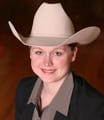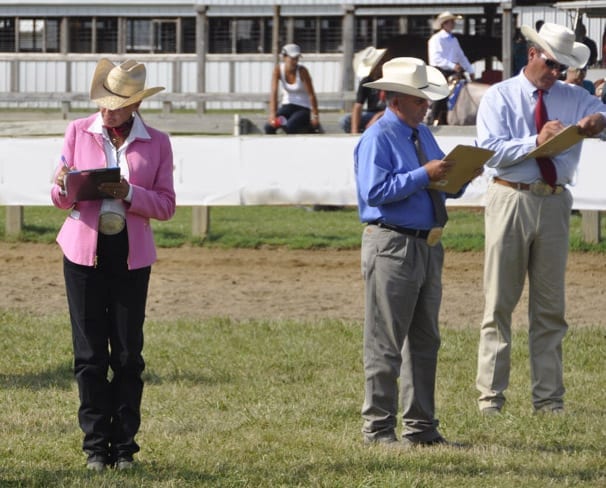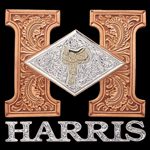The quest to get an AQHA Judge’s card is not an easy one, nor a decision that should be taken lightly. In April, 20 applicants arrived in Amarillo for the sole purpose of enduring the two and one half day testing process which ultimately would be the barometer of whether they received their card or not.
GoHorseShow.com sat down with two of these potential judges shortly after they returned home. Both Laura Kathryn Gilmer and Bruce Walquist help us understand the testing process as well as the emotions involved throughout the stressful days before, during, and after their trip to Amarillo.
*******************************************************************
Resumes:
 Laura Kathryn Gilmer
Laura Kathryn Gilmer
Franklin, Tennessee
– Currently holds NSBA, APHA, NRHA, and PHBA judge’s cards
– 18 time All American Quarter Horse Congress Winner
– Youngest AQHA High Point All-Around winner at age 11
[NPI]/Media/0/jpg/2009/6/1d24ac2d-1ec9-b7d0-76b6ae84214ae4a7.jpg[/NPI]
 Bruce Walquist
Bruce Walquist
Cleburne, Texas
– 30+ Year AQHA Member
– Multiple Congress and World Champion Trainer and Exhibitor
– Father of Whitney Walquist, AQHYA World and Congress Champion
[NPI]/Media/0/jpg/2009/6/1d24ac2d-1ec9-b7d0-76b6ae84214ae4a7.jpg[/NPI]
Why do you want to be an AQHA judge?
LKG: Because I love horses and traveling, and I thought it would be a great way to do both. I also would like to stay involved with AQHA on the highest level. I believe being a judge gives me the opportunity to stay involved without being a trainer or showing horses every weekend like I did when I was a youth kid.
BW: AQHA has been after me for a long time. They would always tell me that I needed to get my judge’s card. I was so busy training horses, breeding horses, showing and being a dad. I kept telling them that until I have the time to learn the other events that I wasn’t going to do it. But I got to the age where I thought I’d try and give back to the Association and I decided to make the time to learn and I went for it.
When did you decide to try to get your AQHA card?
LKG: I first applied in 2005 but I was turned down because I did not have any judging experience. Over the past five years, I have attained my NSBA, APHA, NRHA, and PHBA judge’s cards and have been judging quite a few shows to gain more judging experience. After feeling like I had enough experience, I reapplied in 2008 and was accepted to test in Amarillo in April.
How did you prepare for the tests?
BW: In March, which is about 30 days before you take the test, they have a school for prospective judges that you can go to. It is excellent. They have several people from AQHA come teach their divisions: Bill Ink, Joe Carter, Robbie Schroeder, Leslie Lange, Charlie Cole, Michael Colvin and Lainie Deboer. They also teach you how to judge the roping and cow horse events. The school is optional but I would recommend it to anybody.
Before and right up until the test date, I read the rule book multiple times. I also had a bunch of flash cards and wrote questions down on one side and the answers on the other. Some of the classes have different penalties for break of gate, for example, which makes it tough. It’s funny because classes that I’ve shown in I thought I knew the rules pretty good but I didn’t know half the rules I should have. I’ve shown for years but I didn’t know what I didn’t know.
The Long Road To Amarillo
LKG: Most of us left on the 27th hoping to get to AQHA’s Headquarters in Amarillo that afternoon to start testing the morning of the 28th. However my plane was canceled and then my next flight was delayed so I got to Amarillo six hours later than planned. There were major weather problems. Jennifer Leckey didn’t arrive until the morning we started testing and she had her normal clothes on because her luggage was lost. Luckily, she did have her cowboy hat. Another test applicant arrived really late. Needless to say, I would recommend you try to arrive a few days before the test.
Day 1 – Morning
The Rulebook Test
LKG: Starting the morning of the 28th, we had the 100 question rulebook test that counted for 100 points. You have to score an 80 on the rulebook test or you cannot get your card no matter how you do on the rest of the judging.
BW: Amarillo and AQHA did not try to put any tricky questions in the rule book test. They tried to test your knowledge. They were very fair and straightforward. You either knew it or you didn’t.
Day 1 – Afternoon
Live Judging Test
LKG: After the written test, we went to the show grounds and judged 15 live classes: Calf Roping, Heading, Heeling, Western Pleasure, Horsemanship, Showmanship, Working Hunter, Hunter Under Saddle, Equitation, Reining, Western Riding, Performance Halter Geldings, Yearling Mares, Two-year-old mares, and Aged Mares. There were six exhibitors in each class. Each live class counted for 100 points. There was a panel of judges: Pete Kyle, Don Topliff and Joe Carter that averaged their placing to come up with the official placings.
BW: In the live classes, you’re really competing against the person standing next to you. It’s a contest. You have to judge it the way you want to but you also have to judge it the way you think the panel is going to judge it. If you don’t you will miss points, and I can tell you, I missed points because in a couple of classes I thought, ‘I know how they’re going to do that but I don’t like that. I’m going to do it my way and that’s ok.’
Day 2 – Morning
Interviews
LKG: On the 29th, we had four different interviews: Cattle, Western, English, and Judging Emphasis and Ethics. They asked me questions about my experience in those events and some questions on the live judging.
BW: I had no idea what they were going to ask in the interviews. Turns out, they ask how you placed some of the classes and they want justification on why you placed it the way you did. They look to see how you handle yourself, how you give you reasons. They score you on how well you take the test and handle the pressure. At one point, one of the interviewers had a weird look on his face when I was answering and I wondered ‘Is he trying to trick me?’ I think they want to know whether or not you’re going to be a good representative if a parent comes up and questions you or something like that.
Day 2 – Afternoon
Video Judging
LKG: After the interviews, we had to judge 15 different horses on video for the Working Hunter, Trail, and Reining. We had to pick the top five of each class. If you got the correct five then you would get 50 points total for that class. For the Cutting, we had to judge 12 horses on video and pick the top five in that class. Before each video, we took a 25 question test about that particular event. At the end, we got the official placings for the live and video testing, so we were able to get some sort of idea how we did on those parts of the test.
BW: I’ve been warned that the video judging was tough to see and hear before, but let me tell you, it was great. You can hear ticks in the trail you can hear and see everything. They have done a very good job of putting these tapes together.
Day 3- Morning
The Final Meeting
BW: The next morning Mr. (Alex) Ross came in and asked everyone how they were. All I know is that there was not one person in there holding their head up high. It was a very humbling and stressful experience. It really made me appreciate all of the judges and what they went through to get their card. It was very fair and if I don’t get my card, it was nobody’s fault but my own!
What were your emotions when you were done?
LKG: I was exhausted but at the same time, I was so wound up it was hard for me to relax. I felt I tried my best and put forth a great amount of effort to prepare for this test.
BW: When I was finished, I thought ‘I’m not going to pick up that rule book for 30 days.’ I didn’t for a couple of days but there were a couple of questions that bugged me so I grabbed that rule book and I thought ‘It’s not in here,’ so I decided that question was more of a how are you going to handle yourself since it’s not in the book. I have not judged any more videos but I catch myself thinking ‘Penalty one, penalty three, I’d plus that!‘ I also find myself watching classes at the horse show with more of a judge’s perspective than a trainer’s perspective.
What was the most nerve wracking part?
LKG: Personally for me, it was the cattle interview because that is my weakest event. There were a couple of questions that caught me off guard, but most of the time, my past judging and horse show experience was helpful in coming up with answers to difficult questions.
BW: The hardest part for me is waiting to find out if I got it or not. Also, waiting to do this until my fifties, there was a little bit of anxiety going back to school. Joe Carter said to me, ‘I’ve been trying to get you for 25 years,’ so it really was my fault. But it’s very stressful. You realize it is do or die.
Do you have any predictions on how you did?
LKG: I think I did pretty well, but it depends on how everyone else did on their test. I hope I pass because I don’t really care to go through the testing process again.
BW: I’m going to reserve judgment. I think I’m going to sit on the fence until I find out. (laughs)
Congratulations to both Laura and Bruce! They were two of the nine newly appointed AQHA judges. Click here to see who else received their card and read comments by Alex Ross, AQHA Executive Director of Judges.








